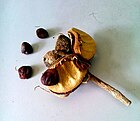Note: This is a project under development. The articles on this wiki are just being initiated and broadly incomplete. You can Help creating new pages.
Difference between revisions of "Magnolia champaca - Champaka"
| Line 2: | Line 2: | ||
'''Champaca''' is a large evergreen tree with a close tapering conical to cylindrical crown composed of ascending branches. It can grow 33 metres or more tall, with some specimens attaining 50 metres. | '''Champaca''' is a large evergreen tree with a close tapering conical to cylindrical crown composed of ascending branches. It can grow 33 metres or more tall, with some specimens attaining 50 metres. | ||
==Uses== | ==Uses== | ||
| − | {{Uses|Leprosy}}, {{Uses|Boils}}, {{Uses|Itching}}, {{Uses|Dyspepsia}}, {{Uses|Nausea}}, {{Uses|Fever}}, {{Uses|Puerperal mania}}, {{Uses|Delirium}}, {{Uses|Maniacal excitement}}, {{Uses|Renal diseases}}, {{Uses|Gonorrhoea}}, {{Uses|Inflammation}}. | + | {{Uses|Leprosy}}, {{Uses|Boils}}, {{Uses|Itching}}, {{Uses|Dyspepsia}}, {{Uses|Nausea}}, {{Uses|Fever}}, {{Uses|Puerperal mania}}, {{Uses|Delirium}}, {{Uses|Maniacal excitement}}, {{Uses|Renal diseases}}, {{Uses|Gonorrhoea}}, {{Uses|Inflammation}}.<ref name="Uses"/> |
==Parts Used== | ==Parts Used== | ||
| Line 76: | Line 76: | ||
<ref name="Ayurvedic preparations">[https://easyayurveda.com/2015/02/28/michelia-champaca-uses-research-side-effects/ Ayurvedic preparations]</ref> | <ref name="Ayurvedic preparations">[https://easyayurveda.com/2015/02/28/michelia-champaca-uses-research-side-effects/ Ayurvedic preparations]</ref> | ||
<ref name="How to plant/cultivate">[http://tropical.theferns.info/viewtropical.php?id=Magnolia+champaca Cultivation]</ref> | <ref name="How to plant/cultivate">[http://tropical.theferns.info/viewtropical.php?id=Magnolia+champaca Cultivation]</ref> | ||
| + | <ref name="Uses">Karnataka Medicinal Plants Volume - 2 by Dr.M. R. Gurudeva, Page No. 715</ref> | ||
</references> | </references> | ||
Revision as of 10:48, 11 August 2021
Champaca is a large evergreen tree with a close tapering conical to cylindrical crown composed of ascending branches. It can grow 33 metres or more tall, with some specimens attaining 50 metres.
Contents
- 1 Uses
- 2 Parts Used
- 3 Chemical Composition
- 4 Common names
- 5 Properties
- 6 Habit
- 7 Identification
- 8 List of Ayurvedic medicine in which the herb is used
- 9 Where to get the saplings
- 10 Mode of Propagation
- 11 How to plant/cultivate
- 12 Commonly seen growing in areas
- 13 Photo Gallery
- 14 References
- 15 External Links
Uses
Leprosy, Boils, Itching, Dyspepsia, Nausea, Fever, Puerperal mania, Delirium, Maniacal excitement, Renal diseases, Gonorrhoea, Inflammation.[1]
Parts Used
Flowers, Fruits, Leaves, Roots, Bark.
Chemical Composition
It contains isoeugenol, benzoic acid, benzyl alcohol, benzaldehyde, cineol and p -cresol methyl ether.[2]
Common names
| Language | Common name |
|---|---|
| Kannada | Sampagebuvon, Sumpaghy |
| Hindi | Champa |
| Malayalam | Bongas jampacca, Champakam |
| Tamil | Shampang, Shembugha |
| Telugu | Shampangi-puvon, Champakamu |
| Marathi | NA |
| Gujarathi | Champo, Pilo champo |
| Punjabi | NA |
| Kashmiri | NA |
| Sanskrit | Champaka |
| English | Golden champa |
Properties
Reference: Dravya - Substance, Rasa - Taste, Guna - Qualities, Veerya - Potency, Vipaka - Post-digesion effect, Karma - Pharmacological activity, Prabhava - Therepeutics.
Dravya
Rasa
Tikta (Bitter), Kashaya (Astringent), Katu
Guna
Laghu, Rooksha
Veerya
Sheeta
Vipaka
Katu
Karma
Kapha, Vata, Pitta
Prabhava
Habit
Identification
Leaf
| Kind | Shape | Feature |
|---|---|---|
| Simple | Spiral | Petiole 1-3 cm long, stout and planoconvex in cross section |
Flower
| Type | Size | Color and composition | Stamen | More information |
|---|---|---|---|---|
| Solitary | 2-4cm long | Yellow | Flowering are Axillary and Fragrant |
Fruit
| Type | Size | Mass | Appearance | Seeds | More information |
|---|---|---|---|---|---|
| Follicles | 2-3 cm long | Arranged as spike | 1 | Fruits are Dehiscing dorsally |
Other features
List of Ayurvedic medicine in which the herb is used
Where to get the saplings
Mode of Propagation
How to plant/cultivate
A plant of the wet tropics and subtropics, also able to be grown in the warm temperate zone. It is found growing at elevations from near sea level to 2,100 metres.[5]
Commonly seen growing in areas
Temperate area, Cultivated areas, Himalayas region.
Photo Gallery
References
- ↑ Karnataka Medicinal Plants Volume - 2 by Dr.M. R. Gurudeva, Page No. 715
- ↑ Chemistry
- ↑ Morphology
- ↑ Ayurvedic preparations
- ↑ Cultivation
External Links
- Ayurvedic Herbs known to be helpful to treat Leprosy
- Ayurvedic Herbs known to be helpful to treat Boils
- Ayurvedic Herbs known to be helpful to treat Itching
- Ayurvedic Herbs known to be helpful to treat Dyspepsia
- Ayurvedic Herbs known to be helpful to treat Nausea
- Ayurvedic Herbs known to be helpful to treat Fever
- Ayurvedic Herbs known to be helpful to treat Puerperal mania
- Ayurvedic Herbs known to be helpful to treat Delirium
- Ayurvedic Herbs known to be helpful to treat Maniacal excitement
- Ayurvedic Herbs known to be helpful to treat Renal diseases
- Ayurvedic Herbs known to be helpful to treat Gonorrhoea
- Ayurvedic Herbs known to be helpful to treat Inflammation
- Herbs with Flowers used in medicine
- Herbs with Fruits used in medicine
- Herbs with Leaves used in medicine
- Herbs with Roots used in medicine
- Herbs with Bark used in medicine
- Herbs with common name in Kannada
- Herbs with common name in Hindi
- Herbs with common name in Malayalam
- Herbs with common name in Tamil
- Herbs with common name in Telugu
- Herbs with common name in Gujarathi
- Herbs with common name in Sanskrit
- Herbs with common name in English
- Habit - Tree
- Index of Plants which can be propagated by Seeds
- Herbs that are commonly seen in the region of Temperate area
- Herbs that are commonly seen in the region of Cultivated areas
- Herbs that are commonly seen in the region of Himalayas region
- Herbs
- Magnoliaceae





